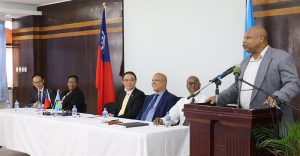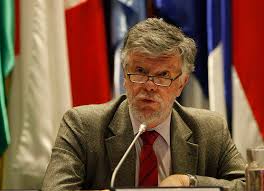A Representative Sample Of Cocoa Products Displayed In The Celebration Of The 40th Anniversary Of Iica In Trinidad And Tobago.
The Inter-American Institute for Cooperation on Agriculture (IICA) and the Cocoa Development Company of Trinidad and Tobago (CDCTTL) have launched the creation of a Platform for Industrial Dialogue that will bring together producers and public and private stakeholders of the cocoa chain in order to streamline efforts aimed at improving the competitiveness and development of the cocoa sector in the Caribbean nation.
Specialists from the IICA delegations in Trinidad and Tobago, Jamaica, and Saint Lucia, as well as staff members and the Chairman of CDCTTL, Winston Rudder, form part of the team responsible for combining technical expertise and experiences in order to identify practical mechanisms for establishing and managing the platform. The initiative is expected to serve as a key instrument for driving the development of the cocoa chain.
“The industry’s platforms for dialogue must be inclusive and capable of managing the various interests, priorities and expectations of key stakeholders of the public and private sectors. IICA has reaffirmed its commitment to supporting the creation of the platform, which will facilitate the sharing of strategic information, communication processes and work between CDCTTL and its development partners. This, in turn, will strengthen the role of the cocoa industry in the country’s socioeconomic development,” explained Kurt Manrique, International Specialist in Agricultural Innovation at the IICA Delegation in Trinidad and Tobago.
Additionally, Rudder indicated that “the development of this sector has included the participation of critical stakeholders such as the Ministry of Agriculture, Land and Fisheries; the Ministry of Trade and Industry; the Ministry of Health; the National Export Facilitation Organization of Trinidad and Tobago; the University of the West Indies Cocoa Research Center (UWI-CRC); as well as farmers and processors.”
The Chairman of the CDCTTL highlighted the fact that all interested parties from the cocoa industry are responsible for ensuring that cocoa beans and value-added products are of the highest quality, in accordance with the global reputation of Trinidadian cocoa.
Over the past two years, Trinidad and Tobago has carried out a number of actions such as fumigating cocoa plantations, providing training sessions for producers on good agricultural practices to improve the quality of cocoa beans, and generating the necessary conditions to transform this sector into a competitive industry. However, the country has identified the need for a platform that could link together and bolster all of these efforts.
Manrique described the successful experiences of other platforms such as the Peru Cocoa Alliance (PCA), a public platform that brings together various interested parties in order to drive the development of the country’s cocoa industry. This mechanism is supported by the U.S. Agency for International Development (USAID).
By January 2019, the European Union will implement a new regulation on cadmium levels in cocoa, which could affect Trinidad and Tobago’s capacity to continue exporting high-value fine and flavour cocoa beans.
For this reason, the UWI-CRC will participate in an upcoming forum organized by the PCA on research initiatives aimed at mitigating cadmium in cocoa. The Center will present its innovative work in order to contribute to developing solutions to this issue.


